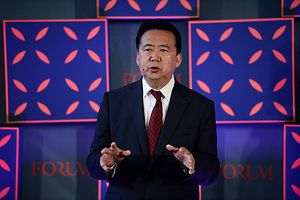For many China watchers, it has already become a pattern: A prominent Chinese citizen suddenly disappears from the public view. Relatives and friends say that the person can’t be reached. A rumor emerges that the person is under investigation by “relevant organs.” Days, weeks, or even months after the disappearance, the Chinese authorities finally confirm that the citizen has indeed been detained.
As The Diplomat has noted, such a pattern occurred in the cases of Wu Xiaohui (the founder of Anbang, the Chinese insurance conglomerate that purchased the luxury Waldorf Astoria hotel in New York in 2014), Zhang Yang (a former member of Chinese Central Military Commission — the highest body that oversees the Chinese military), Sun Zhengcai (former Chinese Communist Party leader of Chongqing city, who was seen as a one-time rival to Chinese President Xi Jinping), and many other Chinese citizens, both famous and less well-known.
Even so, Interpol President Meng Hongwei’s dramatic disappearance, together with the Chinese authority’s recent confirmation of Meng’s detention, is still a phenomenal case in the eyes of the worldwide audience. It’s undoubtedly another hard blow to China’s image.
The case once again demonstrates to the world “what an authoritarian government is like and what it means to be a citizen in such a country,” as Li Yuan, former editor of the Chinese edition of WSJ.com, emphasized on her Twitter account.
Christopher Balding — a former professor who had taught for nine years at Peking University’s HSBC School of Business in Shenzhen but lost his job this year for his vocal criticism of Beijing’s censorship — tweeted, “Whenever someone equates issues in China and the US, just remember, China just disappeared the head of an international organization who happens to be one of their own citizens.”
More analysts further pointed out that the case has been a “self-inflicted blow to China’s efforts to prove itself ready for more prominent roles in global affairs,” as the New York Times put it.
“Imagine if China were to somehow, someday, get a U.N. secretary general, and then he too one day disappeared,” Michael Caster, a researcher and human rights advocate in Bangkok who studies China’s legal system, told the Times. “The brazenness with which China operates outside all concept or procedure of international norms is really concerning.”
Even the South China Morning Post, the Hong Kong-based newspaper, cited analysts arguing that the detention of Meng “harms confidence in Chinese leaders of global bodies.”
Paul Haenle, director of the Carnegie-Tsinghua Center for Global Policy in Beijing, told the SCMP that “Meng’s sudden disappearance had sent shock waves through the international community, lending credence to critics who said China was not ready to take on important leadership roles.”
Notably, Bill Bishop, a prominent U.S.-based China watcher, commented on Meng personally through his Twitter account: “Amazed that people think Meng is somehow an innocent victim… you don’t rise to vice minister of public security in China if you are…” Such a point of view is common among many familiar with Chinese politics, which is full of deep dark stories.
However, the critical point in this case is not whether Meng is an innocent victim or not. Even if Meng has committed serious crimes, he — like all other Chinese citizens — deserves procedural justice, one core value of the rule of law which China often ignores.
Now, in front of the international press, China is eating the bitter fruit by seeing its image tarnished once again — even if the Chinese authorities would never admit it publicly.

































